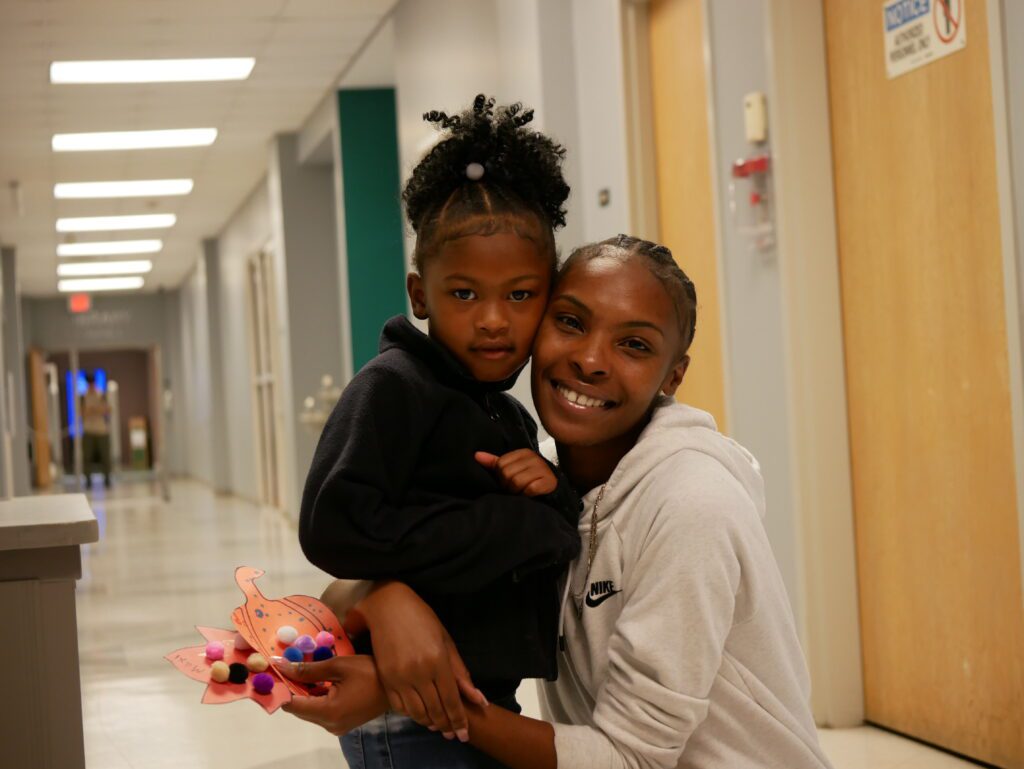First free drop-in care at a community college
Early Bird readers, hello again. Newcomers, welcome! If you were forwarded this email, you can sign up here to receive it every two weeks, and join our conversation on issues facing North Carolina’s young children and those who support them. If you’re already a subscriber, please help us reach more people by sharing this with your friends and co-workers interested in early childhood education.

I’m happy to be back in your inbox. Since our trip to Michigan, Katie and I have been reporting back in North Carolina, from the mountains to the coast.
I visited Cape Fear Community College, the first community college in the state to provide free drop-in child care for students. I wanted to know how and why they made that happen, which I wrote about here.
During my day at the college, I met Bria Cromartie, the mother in the photo above. Cromartie is studying advertising and graphic design at Cape Fear. She’s been able to use the drop-in program when the schedule of the school where her 4-year-old daughter attends pre-K doesn’t line up with her class schedule at Cape Fear.
I was inspired by Bria, who lit up as she talked about how much she was enjoying her classes: figuring out Adobe software, wondering about photography, dipping her toes in different mediums. She asked about the camera around my neck and about what my job as a reporter entails. She was eager to learn, and she was so grateful for the support of the drop-in program. It was not the only thing keeping her in school, but it was removing one stressor from her day, enabling her to focus, to be excited about her future.
Bria shared that Maxlynn also attends a home-based program after the pre-K day is finished. Bria’s story reminded me of two things: that parents deserve supports to invest in themselves, and that families need different, flexible options that fit into their patchwork of child care arrangements and obligations for work and school.
Cape Fear isn’t alone in beginning to address this need. Just last week, Carteret Community College and UNC-Greensboro received federal grants to provide child care supports through the CCAMPIS program. East Carolina University has begun offering drop-in care for students in the evenings for a small fee. Other community college leaders have told me they are interested in opening drop-in care for students and community members. But it’s hard to find space, manage logistics, and of course secure funding. Check out the piece for how Cape Fear leaders overcame those barriers.
Below, don’t miss Katie’s report on YWCA Asheville, a child care center working to end early childhood exclusionary discipline by first taking care of teachers, plus tons of news, research, and events centered on young children and the people and systems they rely on.
We’re headed to Massachusetts and Vermont this week for our second Learning Adventure, trips to learn from states leading the way in early childhood policy and investment. Reply to this email or join the Early Bird Facebook group to let us know what you think we should be asking. We’ll be posting updates along the way in the Facebook group as well. Come one, come all!
More from EdNC on early childhood
Meeting the needs of teachers to end the preschool-to-prison pipeline
At the YWCA in Asheville, the process of eliminating the use of exclusionary discipline in early childhood care and education...Join Early Bird on Facebook
We want to engage more directly and deeply with our audience, and to build a sense of community among those...The big picture for little kids
News & Research
-
Kentucky had an outside-the-box idea to fix child care worker shortages. It's working - From NPR
-
Priorities set, early childhood advocates turn focus to policy changes - From North Carolina Health News
-
Where do babies stand across America and in NC? - From NC Early Childhood Foundation
-
Early Investment, a Lifetime of Returns: Articulating the Value of Early Childhood Investments in Virginia - From The Prenatal-to-3 Policy Impact Center
-
What’s Behind the Gaps in Early Intervention Services—And What It Means for K-12 Schools - From Education Week
-
Early Care and Education Providers Vary in Their Availability and Flexibility to Meet Hispanic Families’ Needs - From The National Research Center on Hispanic Children and Families
Taking flight! Opportunities to spread your wings
-
Kitchen Table Talks: Child Care Challenges - From Empowered Parents in Community (EPiC)
For those in the Durham area, EPiC is hosting an event at Durham Children’s Initiative on October 24 from 6-8 pm. Dinner and child care will be provided. From the organization:Join us as we address barriers that impact both Black families and childcare providers while working collaboratively to determine solutions that create access, increased funding, and ongoing advocacy efforts. -
The Creative Leadership Workshop - From Hope Made Real
Carol Sullivan-Riddle, an artist and researcher who has focused her graduate studies on advancing equitable opportunities for women, children, and families, is hosting a creative workshop on November 17 from 10 am to 3:30 pm at the Thomas G. Crowder Woodland Center in Raleigh. From Carol:
The workshop will gather Triangle community members, non-profit leaders, researchers, and educators to discuss and share how they’re approaching the problems surrounding access to and the work of early childhood education, public schooling, career equity, and caregiving.
-
The Zero to Three Learn Institute - From Zero to Three
This conference on December 5-6 in Palm Springs “is designed to advance in-depth exploration, reflection and considerations for application in practice. It brings together infant and early childhood mental health (IECMH) and early childhood education professionals (ECE) from diverse backgrounds for a two-day deep dive into one of the top issues facing our field.”
-
Funding for community organizations advocating for food security - From Blue Cross Blue Shield of North Carolina Foundation
Applications close October 27 for community-based organizations to apply for grants (up to $300,000 or $100,000 per year, per organization) to increase their capacity to advocate for access to healthy foods for those most food insecure. Note: The foundation supports the work of EdNC.
-
Training for women interested in running for statehouses - From Vote Run Lead Action
Vote Run Lead Action is an organization with a goal to have at least 51% of seats in state legislatures held by women. They are offering a training on November 17-19 in Detroit, Michigan, for potential candidates as well as those interested in managing campaigns. From the organization:
It will be a dynamic, participatory, and supportive learning environment where you can explore your leadership style, reinforce your talents and strengths, and identify areas for growth.



